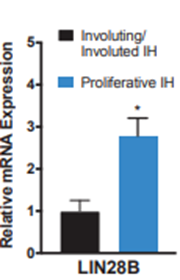Advantages:
- Mechanism of infantile hemangioma (IH) involution mediated by propranolol treatment
- Novel Diagnostic Cancer Biomarker for infantile hemangioma: LIN28B
- Therapeutic applications beyond infantile hemangiomas, for propranolol sensitive tumors
Business Summary:
The β-adrenergic receptor antagonist propranolol has been shown to have a therapeutic benefit in benign tumors, such as infantile hemangiomas (IHs). IHs are the most common benign vascular tumors of infancy. IH lesions are characterized by a rapid growth phase followed by a spontaneous involution, or triggered by propranolol treatment by poorly understood mechanisms.
The inventor has uncovered the role of the LIN28B/let-7 switch in infantile hemangioma pathogenesis and provides a novel mechanism by which propranolol induces IH involution. Specifically, it was discovered that the reprogramming factor LIN28B is highly expressed in the proliferative IH phase and is less expressed in the involuted IH phase and in IH tissues from propranolol-treated patients. The high LIN28B expression in proliferative IH correlates with the expression of the ESC-enriched mir-498(46)44–46 and is inversely correlated with the expression of let-7 miRNAs. Treatment of iPSCs with propranolol reduced the proliferation of iPSCs and reduced the expression of LIN28B and mir-498(46) while inducing the expression of let-7 family of miRNAs and EMT genes. As a result, this research describes LIN28B as a novel therapeutic biomarker that can be used for detecting and treating tumors and cancers with propranolol in which the LIN28/let-7 pathway is imbalanced.

LIN28B is highly expressed in proliferative Infantile Hemangioma.
Desired Partnerships:
- License
- Sponsored Research
- Co-Development